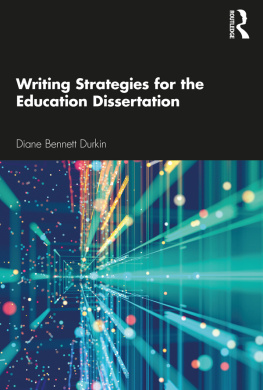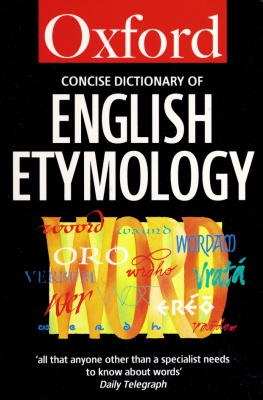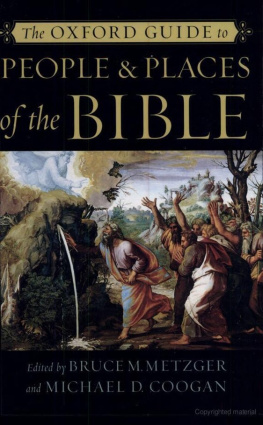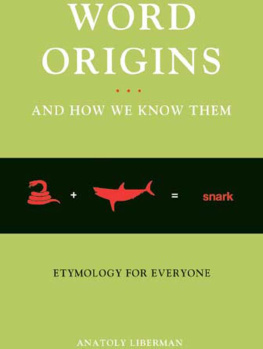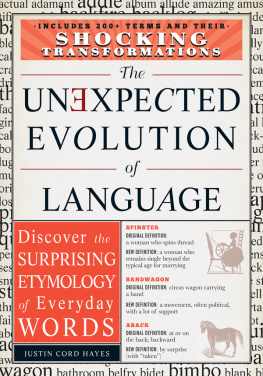Durkin - The Oxford guide to etymology
Here you can read online Durkin - The Oxford guide to etymology full text of the book (entire story) in english for free. Download pdf and epub, get meaning, cover and reviews about this ebook. City: Oxford, year: 2013;2011, publisher: Oxford University Press, genre: Children. Description of the work, (preface) as well as reviews are available. Best literature library LitArk.com created for fans of good reading and offers a wide selection of genres:
Romance novel
Science fiction
Adventure
Detective
Science
History
Home and family
Prose
Art
Politics
Computer
Non-fiction
Religion
Business
Children
Humor
Choose a favorite category and find really read worthwhile books. Enjoy immersion in the world of imagination, feel the emotions of the characters or learn something new for yourself, make an fascinating discovery.

The Oxford guide to etymology: summary, description and annotation
We offer to read an annotation, description, summary or preface (depends on what the author of the book "The Oxford guide to etymology" wrote himself). If you haven't found the necessary information about the book — write in the comments, we will try to find it.
Durkin: author's other books
Who wrote The Oxford guide to etymology? Find out the surname, the name of the author of the book and a list of all author's works by series.
The Oxford guide to etymology — read online for free the complete book (whole text) full work
Below is the text of the book, divided by pages. System saving the place of the last page read, allows you to conveniently read the book "The Oxford guide to etymology" online for free, without having to search again every time where you left off. Put a bookmark, and you can go to the page where you finished reading at any time.
Font size:
Interval:
Bookmark:
The Oxford Guide to Etymology
For my parents
Philip Durkin


Great Clarendon Street, Oxford ox2 6DP
Oxford University Press is a department of the University of Oxford.
It furthers the Universitys objective of excellence in research, scholarship,
and education by publishing worldwide in
Oxford New York
Auckland Cape Town Dar es Salaam Hong Kong Karachi
Kuala Lumpur Madrid Melbourne Mexico City Nairobi
New Delhi Shanghai Taipei Toronto
With offices in
Argentina Austria Brazil Chile Czech Republic France Greece
Guatemala Hungary Italy Japan Poland Portugal Singapore
South Korea Switzerland Thailand Turkey Ukraine Vietnam
Oxford is a registered trademark of Oxford University Press
in the UK and in certain other countries
Published in the United States
by Oxford University Press Inc., New York
Philip Durkin 2009
The moral rights of the author have been asserted
Database right Oxford University Press (maker)
First published 2009
First published in paperback 2011
All rights reserved. No part of this publication may be reproduced,
stored in a retrieval system, or transmitted, in any form or by any means,
without the prior permission in writing of Oxford University Press,
or as expressly permitted by law, or under terms agreed with the appropriate
reprographics rights organization. Enquiries concerning reproduction
outside the scope of the above should be sent to the Rights Department,
Oxford University Press, at the address above
You must not circulate this book in any other binding or cover
and you must impose the same condition on any acquirer
British Library Cataloguing in Publication Data
Data available
Library of Congress Cataloging in Publication Data
Data available
Typeset by SPI Publisher Services, Pondicherry, India
Printed in Great Britain
on acid-free paper by
Ashford Colour Press Ltd, Gosport, Hants.
ISBN 9780199236510(hbk)
9780199691616 (pbk.)
1 3 5 7 9 10 8 6 4 2
As my day job I lead the team of specialist editors researching, writing, and revising etymologies for the new edition of the Oxford English Dictionary. As a result my first debt of gratitude must be to all of my colleagues, past and present, for their deep expertise, stimulating questions, and very good company, over (so far) fourteen years of highly enjoyable and rewarding collaborative research.
I am very grateful to the following people and institutions for kind invitations to give lectures and papers which drew extensively on draft chapters of this book: Derek Britton and the Institute for Historical Dialectology at the University of Edinburgh; Hans Sauer and the University of Munich; Ursula Lenker and the University of Eichsttt; Hans Sauer and Ursula Lenker and the Fifteenth International Conference on English Historical Linguistics, Munich, 2008. To the audiences at each of these papers I am grateful for many helpful suggestions and observations, and not least for confirming that there is an audience for a book of this sort.
I am enormously grateful to all of those who have commented on parts of this book in draft: Kathryn Allan, Joan Beal, Alan Durant, Anthea Fraser Gupta, Christian Kay, Peter McClure, Inge Milfull, Nicholas Sims-Williams; and to the following who were generous and brave enough to read drafts of the whole book: Anthony Esposito, Meg Laing, Roger Lass, Anna Morpurgo Davies, John Simpson, and Edmund Weiner. The book as it stands today has benefitted enormously from the keen eyes and still keener intellects of all of these people. Needless to say, all errors and omissions are to be laid, with complete justice, entirely and exclusively at my own door.
I am hugely grateful also to John Davey at OUP for his help, advice, and encouragement at every stage in the process of shaping, writing, and producing this book. Elmandi du Toit, Malcolm Todd, and Lesley Rhodes provided expert input on the production of the book.
I would also like to thank Kathryn Allan a second time, for putting up with me on the many days when even brimming pots of coffee were not enough to focus the mind and drive away irritation. And finally I would like to thank the dedicatees of this book for tolerating a childs at times rather obsessive interest in very old documents and even older words.
Etymologies appeal to people with a very wide variety of interests and intellectual backgrounds. A very few people, such as myself, spend most of their time researching etymologies. A slightly larger number do so very occasionally. Many, many more people look at etymologies, but have never researched any themselves. Some people will never even have thought of etymologies as things which need to be researched. Particularly when etymologies are encountered in the compressed form found in many dictionaries, they can seem to be a given, rather than the (often very tentative) results of extensive research.
This book is intended for anyone who has taken the important first step of realizing that etymologies are the result of research, and would like to discover something about the nature of that research, and the principles and methodologies which underlie it.
I have attempted to frame this book so that it is addressed most centrally to someone who has an interest in historical linguistics, the study of how languages change and develop over time. Etymology is a part of this wider field, and anyones understanding of etymology will be greatly enriched by at least some acquaintance with the broader concerns of the discipline as a whole. Readers who are entirely new to this field may find that they get much more out of this book if they read it in conjunction with one of the many excellent general textbook introductions to historical linguistics, such as Schendl (2001) or, in slightly greater depth, Millar (2007, which is a revised edition of Trask 1996) or Campbell (2004); for an excellent introduction to a wide variety of linguistic topics focussing on the vocabulary of English see Katamba (2005).
When deciding what to cover in this book and in how much detail, I have tried to pay particular attention to those areas which are important for etymology but which receive relatively little attention in most introductory books on historical linguistics. Nonetheless, I have also endeavoured to ensure that the book provides a balanced account of all aspects of etymology, especially for readers who are prepared to follow up references to fuller discussions of any topics which may be new or unfamiliar.
Most of my examples will be drawn from English, since this is the one language that any reader of this book will necessarily have some knowledge of. However, my aim has been to assume no particular knowledge about the history of the English language, beyond the explanations and further references given in the text. Drawing examples from the history of English also brings the advantage that I have in many cases been able to make use of very recent research for the new edition of the Oxford English Dictionary with which I have been involved personally.
Access to a good etymological dictionary of English would be of great benefit to anyone reading this book. In particular, access to the full Oxford English Dictionary, especially in its online version (www.oed.com), would be of especial benefit, so that many examples given here in summary form can be pursued in greater detail. (The dictionary can be accessed online via most institutional libraries and many public libraries.)
Next pageFont size:
Interval:
Bookmark:
Similar books «The Oxford guide to etymology»
Look at similar books to The Oxford guide to etymology. We have selected literature similar in name and meaning in the hope of providing readers with more options to find new, interesting, not yet read works.
Discussion, reviews of the book The Oxford guide to etymology and just readers' own opinions. Leave your comments, write what you think about the work, its meaning or the main characters. Specify what exactly you liked and what you didn't like, and why you think so.



